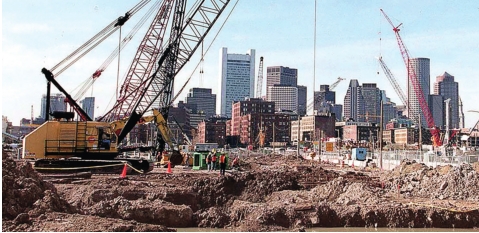
Another month, another dismal report from the front lines of Boston’s losing battle to put a dent in the city’s increasingly dire housing crisis.
Boston issued building permits for just 852 new housing units during the first six months of 2025, according to the city’s Building Department.
It marked the worst start since at least 2018 and a 27 percent drop from 2024’s anemic housing numbers.
By comparison, Boston issued permits for nearly 2,200 new housing units during the first half of 2018 during the tail end of Boston Mayor Marty Walsh’s final term in office.
The
plunge in housing construction comes as Mayor Michelle Wu, who is up
for reelection this fall, has ramped up tough new affordable housing and
energy efficiency mandates for new projects amid one of the most
challenging markets for real estate development in years.
Mayoral
challenger Josh Kraft took aim at Wu’s development policies, which he
has blamed for the implosion in residential construction in Boston.
“Delays
and incompetence have added time to get projects done and big costs,”
mayoral challenger Josh Kraft said in a statement. “She [Wu] has added
an additional layer to the climate mandates.”

A spokesperson for Boston’s Planning Department referred questions to the mayor’s press office, which did not respond by The Boston Guardian’s deadline.
Meanwhile,
the plunge in new housing construction has coincided with a surge in
prices as the supply of new apartments, homes, and condos has failed to
keep up with demand.
Boston
residential values have shot up by roughly 50 percent since the first
months of 2020, when Walsh left Boston to become U.S. labor secretary,
according to a house price index published by the Federal Reserve Bank
of St. Louis, which tracks all sale transactions.
By
contrast, the index rose by 24 percent during Walsh’s seven years in
office, which was marked by a record amount of housing and commercial
development.
Faced
with the grim new numbers, the head of one of Boston’s top real estate
trade groups called upon Mayor Wu to ease costly new affordable housing
requirements.
For
example, city officials could lower the number of affordable units,
rented or sold at below market rates, that developers are required to
include in every new project, said Greg Vasil, CEO of the Greater Boston
Real Estate Board.
In
particular, Wu should consider lowering that percentage to 13 percent,
where is stood during the Walsh years, down from 20 percent now, Vasil
said.
City officials
could then combine that with a guarantee that would-be housing
developers can get their permits lined up in a reasonable period of
time, say 12-15 months, compared to the now years-long slog they now can
face, he added.
“When
you start a project, you want to deliver it for a certain market,” but
Vasil added, “it can take years to get stuff permitted.”
Greg
Maynard, executive director of the Boston Policy Institute, also argued
for a lowering of the city’s affordability requirements.
Maynard
noted that the city’s own analysis predicted that new residential
construction would not “pencil out in much of the city,” but the Wu
administration went ahead and implemented it anyway.
Tamara
Small, CEO of NAIOP Massachusetts, said the collapse in housing
production in Boston can’t be blamed on any single policy change or
rule.
Rather, it has
to do with a much broader set of rules, regulations and conditions that
have driven up the cost of building housing in Boston to $1 million a
unit.
“A comprehensive
review of all local regulations and requirements affecting development
in Boston needs to be done and it must be done immediately,” Small said.
“The current system is hindering housing production and economic
development. The numbers clearly illustrate this.”
“The future of not just the city, but the entire Commonwealth, depends on it,” she added.
For
his part, Jay Doherty, chief executive of Cabot, Cabot & Forbes
said he is voting with his feet and looking to other cities beyond
Boston to build housing in.
“Boston,
like much of the region, is entirely out of touch with the realities of
the world right now,” the developer said. “There is no tweak or new
policy that can fix it.”
Scott van Voorhis is a longtime Boston reporter specializing in real estate and is the publisher of Contrarian Boston.